Last week, we published a compilation of the 100 greatest cover songs of all time, as voted by the Popdose staff. Of course, our way of tabulating the results (you can see the original spreadsheet here, if you’re really, really, really curious) meant that plenty of worthy songs were going to be left off the final list. So we decided to include a few more songs that some of the staff felt deserved an “honorable mention.” Each of the songs below is special to at least one of us, and even though none of these had broad enough appeal to make our Top 100 list, we thought they were good enough to at least get a tip of the cap.
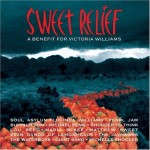 Opelousas (Sweet Relief) – Maria McKee. Originally performed by Victoria Williams.
Opelousas (Sweet Relief) – Maria McKee. Originally performed by Victoria Williams.
Taken by itself, Maria McKee’s cover of Victoria Williams “Opelousas” isn’t all that remarkable of a song. It’s a nice update to the low-key original, with a much bigger sound and scope, but what makes this cover great, and the reason why I included this as my honorable mention, is for what the song means. In 1993, Victoria Williams was diagnosed with multiple sclerosis, and a number of darlings of the nineties alternative scene (including Matthew Sweet, Buffalo Tom, Evan Dando, and the Waterboys) collaborated for a benefit album to help pay for the treatment of the uninsured Williams. As the centerpiece of the album, McKee’s performance brings everything together and reminds us of why this album was conceived in the first place – to provide some relief for a friend in need. — Zack Dennis
Prairie Rose – Big Country. Originally performed by Roxy Music. — Big Country takes the high romance of Bryan Ferry’s lyric and puts it into an unironically heroic context that’s wholly appropriate, but that Roxy Music, saddled with its inherent archness, could never muster. The result is thrilling; a sly little love song for Jerry Hall becomes a paean to the American West itself, a big-sky swirl of guitars and shouts and giddy-up drums. — Jack Feerick
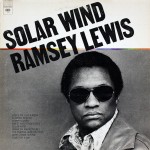 Hummingbird – Ramsey Lewis. Originally performed by Seals & Crofts. — The fact that I never even heard this cover (which was released in 1974) until a few months ago surely speaks to its impact on me. “Hummingbird” is my favorite Seals & Crofts number, opening as it does with a beautiful ascending vocal harmony and mandolin duet. It’s a highly spiritual song (reflecting the duo’s adherence to the BahÁ¡’Á Faith) and captivates me every time with its almost plaintive arrangement. Ramsey Lewis transformed it into a jazz-funk number and instead of speaking to my heart as the original did, this hits me right in the soul. As does the unsung hero of the track, bassist Cleveland Eaton.
Hummingbird – Ramsey Lewis. Originally performed by Seals & Crofts. — The fact that I never even heard this cover (which was released in 1974) until a few months ago surely speaks to its impact on me. “Hummingbird” is my favorite Seals & Crofts number, opening as it does with a beautiful ascending vocal harmony and mandolin duet. It’s a highly spiritual song (reflecting the duo’s adherence to the BahÁ¡’Á Faith) and captivates me every time with its almost plaintive arrangement. Ramsey Lewis transformed it into a jazz-funk number and instead of speaking to my heart as the original did, this hits me right in the soul. As does the unsung hero of the track, bassist Cleveland Eaton.
— Chris Holmes
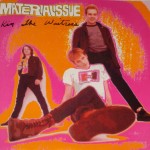 Kim the Waitress – Material Issue. Originally performed by Green Pajamas. — When he first heard this 1985 Green Pajamas song, Material Issue frontman Jim Ellison was allegedly transfixed by its guitar sound. He may well have said something like that, but surely what drew him to the song was its lyric. Though sometimes dismissed as the work of a power-pop nostalgist, many of Jim Ellison’s songs ride a narrow and blurry line between devotion and derangement: “Valerie Loves Me” tells the tale of a would-be lover who fritters his whole life away in devotion to a woman he’s afraid to speak to, while “Goin’ Through Your Purse” is … well, it’s about exactly what it sounds like. “Kim the Waitress” fits this mold so snugly that Ellison must have wondered why he hadn’t written it himself. Certainly he rarely wrote or sang a line as chillingly understated as “She doesn’t come around any more/And that bothers me.” — Dan Wiencek
Kim the Waitress – Material Issue. Originally performed by Green Pajamas. — When he first heard this 1985 Green Pajamas song, Material Issue frontman Jim Ellison was allegedly transfixed by its guitar sound. He may well have said something like that, but surely what drew him to the song was its lyric. Though sometimes dismissed as the work of a power-pop nostalgist, many of Jim Ellison’s songs ride a narrow and blurry line between devotion and derangement: “Valerie Loves Me” tells the tale of a would-be lover who fritters his whole life away in devotion to a woman he’s afraid to speak to, while “Goin’ Through Your Purse” is … well, it’s about exactly what it sounds like. “Kim the Waitress” fits this mold so snugly that Ellison must have wondered why he hadn’t written it himself. Certainly he rarely wrote or sang a line as chillingly understated as “She doesn’t come around any more/And that bothers me.” — Dan Wiencek
You Shook Me All Night Long – Bing Ji Ling. Originally performed by AC/DC. — The wonder of the greatest covers is the way that they force you to reconsider the source material. The magic isn’t in what the interpreter brings to the song, but in the way that he reveals something that was always there. In the grand scheme of things, Bing Ji Ling doesn’t wreak any major changes on this AC/DC classic; the lyrics and the melody are essentially intact, and the guitar solo is reproduced note-for-note. But with just a few tweaks in emphasis, he reveals that inside this hard-rockin’ stompfest there’s a Prince song trying to get out. — Jack Feerick
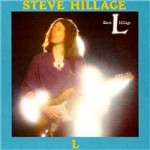 It’s All Too Much – Steve Hillage. Originally performed by The Beatles. — George Harrison’s lysergic-flavored original featured Hendrix-inspired distorted guitar riffs and hazy nursery rhyme-style psych-pop philosophical lyrics, but by the time it saw release, it got tossed off onto the Yellow Submarine soundtrack, its author having moved on to the more rustic vibe of the Band and Bob Dylan. However, it was a natural for Gong alumni Hillage, who in 1976 had hooked up with Todd Rundgren and Utopia for his second solo album L. Hillage was given to slightly goofy, good-natured hippie stylings — I recall reading at the time that someone said that Todd signed up to produce him because “He was the starry-eyed hippie that he wanted to, but could never, be” — but the difference with Hillage was that he could flat out play the shit out of an electric guitar, unleashing numerous gnarly, intricate solos and riffs which made generous use of the whammy bar and whatever pedals he chose to have on hand. He’s also ably assisted by Utopia drummer John “Willie” Wilcox, who funks up the beat and helps it achieve propulsion. Any Hillage album from that period is a delight to listen to for the playing alone, and this was perhaps the best cover song he ever did, certainly featuring some of his best playing. — Johnny B
It’s All Too Much – Steve Hillage. Originally performed by The Beatles. — George Harrison’s lysergic-flavored original featured Hendrix-inspired distorted guitar riffs and hazy nursery rhyme-style psych-pop philosophical lyrics, but by the time it saw release, it got tossed off onto the Yellow Submarine soundtrack, its author having moved on to the more rustic vibe of the Band and Bob Dylan. However, it was a natural for Gong alumni Hillage, who in 1976 had hooked up with Todd Rundgren and Utopia for his second solo album L. Hillage was given to slightly goofy, good-natured hippie stylings — I recall reading at the time that someone said that Todd signed up to produce him because “He was the starry-eyed hippie that he wanted to, but could never, be” — but the difference with Hillage was that he could flat out play the shit out of an electric guitar, unleashing numerous gnarly, intricate solos and riffs which made generous use of the whammy bar and whatever pedals he chose to have on hand. He’s also ably assisted by Utopia drummer John “Willie” Wilcox, who funks up the beat and helps it achieve propulsion. Any Hillage album from that period is a delight to listen to for the playing alone, and this was perhaps the best cover song he ever did, certainly featuring some of his best playing. — Johnny B
Love Will Tear Us Apart – Bis. Originally performed by Joy Division. — Covering a song like this — the final testament of a beloved and tragic figure — is fraught with dangers. There are doubtless Joy Division fans who find the very notion inherently disrespectful, and even on a practical level, the emotional content is so heightened and stylized that a ”reverent” take (like the solemn, folky version by Swans) risks edging into camp. In recasting the song as bratty techno with Speak n’ Spell vocals, Bis sidestep the traps along the way and come up with something gorgeous, euphoric, and surprisingly moving. — Jack Feerick
 We’ve Only Just Begun – Grant Lee Buffalo. Originally performed by The Carpenters. — Recorded for one of those various artists “tribute” CDs, this one featuring “Alternative” musicians of the ’90s like Matthew Sweet, Cracker, Sonic Youth and Shonen Knife having a go at songs made popular by that most un-hip of recording artists, the Carpenters. To most of the artists’ credit, what could have been a real snark-fest was actually approached more or less straight-faced, and the smirking was kept to a minimum. The best, in my opinion, cover was saved for last — Grant-Lee Phillips and Grant Lee Buffalo finish out the disc by applying his soulful croon to this Paul Williams co-write, which Karen and Richard took to #2 in 1970. Phillips, as was his wont with GLB, slows down the tempo just a bit, employs mellotron, piano and echoey guitar fills, and emphasizes the harmonies, using his surprising range to wring all the emotion out of the lyrics, creating a version which never fails to move me. I think it’s one of the best vocal performances I’ve ever heard. — Johnny B
We’ve Only Just Begun – Grant Lee Buffalo. Originally performed by The Carpenters. — Recorded for one of those various artists “tribute” CDs, this one featuring “Alternative” musicians of the ’90s like Matthew Sweet, Cracker, Sonic Youth and Shonen Knife having a go at songs made popular by that most un-hip of recording artists, the Carpenters. To most of the artists’ credit, what could have been a real snark-fest was actually approached more or less straight-faced, and the smirking was kept to a minimum. The best, in my opinion, cover was saved for last — Grant-Lee Phillips and Grant Lee Buffalo finish out the disc by applying his soulful croon to this Paul Williams co-write, which Karen and Richard took to #2 in 1970. Phillips, as was his wont with GLB, slows down the tempo just a bit, employs mellotron, piano and echoey guitar fills, and emphasizes the harmonies, using his surprising range to wring all the emotion out of the lyrics, creating a version which never fails to move me. I think it’s one of the best vocal performances I’ve ever heard. — Johnny B
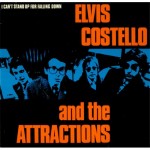 I Can’t Stand Up for Falling Down – Elvis Costello. Originally performed by Sam and Dave. — 1980’s Get Happy!! (mind the two exclamation points, please) became Elvis Costello’s first major stylistic shift in a career filled with them. What began as fairly standard new wave pop/rock songs transformed into Stax-inspired tracks with the Attractions’ own brand of funk and soul. Here EC took a classic soul ballad by Sam & Dave and transformed it with a simple shift in tempo. Suddenly it’s a pop-soul celebration of romantic anguish, retaining all the guts but adding a danceable beat. — Matt Springer
I Can’t Stand Up for Falling Down – Elvis Costello. Originally performed by Sam and Dave. — 1980’s Get Happy!! (mind the two exclamation points, please) became Elvis Costello’s first major stylistic shift in a career filled with them. What began as fairly standard new wave pop/rock songs transformed into Stax-inspired tracks with the Attractions’ own brand of funk and soul. Here EC took a classic soul ballad by Sam & Dave and transformed it with a simple shift in tempo. Suddenly it’s a pop-soul celebration of romantic anguish, retaining all the guts but adding a danceable beat. — Matt Springer
Evil – Cactus. Originally performed by Howlin’ Wolf. — Cactus was the closest equivalent America had to Britain’s premier heavy blues rockers, the mighty Led Zeppelin. While the band’s commercial fortunes were very quickly eclipsed by their British brethren, Cactus’ art has survived into the 21st century thanks in part to incendiary covers like their take on the Howlin’ Wolf chestnut, “Evil.” Never mind the fact that Tim Bogert, Carmine Appice and Jim McCarty were one of the fiercest rhythm sections ever in existence – aggressively raspy lead vocalist Rusty Day belted out tunes like it was his last day on earth and he wanted to go out with an atomic blast. It’s not easy to best a Chess Records classic, but Cactus certainly took this tune to a higher plane. — Michael Fortes
 A Love Bizarre – Michael Hedges. Originally performed by Sheila E. — Under ordinary circumstances, I would probably never listen to the music of the late Michael Hedges; he’s generally categorized as a “New Age” artist, not a label that sets my toes a-tappin’. But his cover of “A Love Bizarre,” recorded live in 1986, makes me think twice about my prejudice. With just his acoustic guitar and fairly undistinguished voice, he finds a depth in the naughty Sheila E./Prince funk-pop duet that recasts it as a romantic, almost spiritual ode to kink, worthy of the Purple One himself. — Robin Monica Alexander
A Love Bizarre – Michael Hedges. Originally performed by Sheila E. — Under ordinary circumstances, I would probably never listen to the music of the late Michael Hedges; he’s generally categorized as a “New Age” artist, not a label that sets my toes a-tappin’. But his cover of “A Love Bizarre,” recorded live in 1986, makes me think twice about my prejudice. With just his acoustic guitar and fairly undistinguished voice, he finds a depth in the naughty Sheila E./Prince funk-pop duet that recasts it as a romantic, almost spiritual ode to kink, worthy of the Purple One himself. — Robin Monica Alexander
Jump – Aztec Camera. Originally performed by Van Halen. — Roddy Frame’s rendition of “Jump” created giddy excitement among his minuscule listenership — and increased the size of that listenership by quite a bit — upon its release as the B-side to “All I Need Is Everything” in late 1984. And why not? It’s the rare cover that, arriving so closely on the heels of its instant-classic antecedent, somehow manages to simultaneously mock and celebrate the original. Jumping off, so to speak, from a decision to hear the chorus as an expression of resignation rather than invigoration — “Aaahhhh, you might as well…jump” — Frame slows the song down to a languid pace that transforms its message almost entirely. How often does one song spawn two classic versions within a year that seem to come from two different planets? — Jon Cummings





Comments